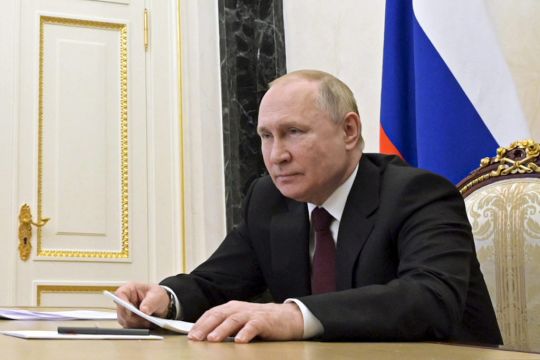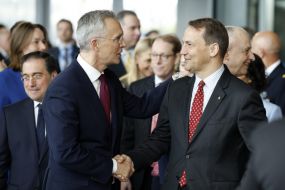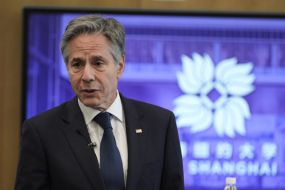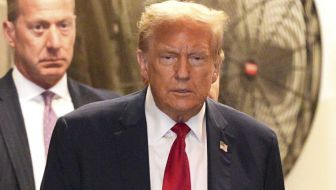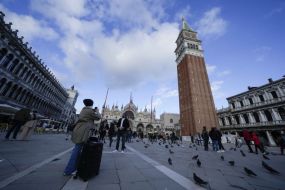Russian president Vladimir Putin has convened senior officials to consider recognising the independence of Russia-backed separatist regions in eastern Ukraine.
The meeting of the presidential security council will likely increase Western fears that Russia could invade Ukraine any moment, using skirmishes in eastern areas of the country as a pretext for an attack.
Mr Putin’s statement follows televised appeals by separatist leaders.
They pleaded with Mr Putin to recognise them as independent states and sign friendship treaties envisaging military aid to protect them from what they described as the ongoing Ukrainian military offensive.
Ukrainian authorities have denied launching any offensive and have accused Russia of provocation amid intensified shelling along the line of contact.
The Kremlin initially signalled its reluctance to make the move that would effectively shatter a 2015 peace deal for eastern Ukraine that marked a major diplomatic coup for Moscow, requiring Ukrainian authorities to offer broad self-rule to the rebel regions.
However, Mr Putin argued on Monday that Ukrainian authorities have shown no appetite for implementing the deal.
The US and Russian presidents have tentatively agreed to meet in a last-ditch effort to stave off a possible invasion of Ukraine.
The American people are united. Europe is united. The Transatlantic community is united. The entire free world is united.
Russia has a choice — between war and all the suffering that it will bring — or diplomacy that will make the future safer for everyone.— President Biden (@POTUS) February 18, 2022
Advertisement
If Russia invades, as the US claims Moscow has already decided to do, the meeting will not happen.
However, the prospect of a face-to-face summit resuscitated hopes that diplomacy could prevent a devastating conflict, which would result in massive casualties and huge economic damage across Europe, which is heavily dependent on Russian energy.
Russia has massed an estimated 150,000 troops on three sides of Ukraine, a western-looking democracy that has defied Moscow’s attempts to pull it back into its orbit.
Even as diplomatic efforts inched forward, potential flashpoints multiplied. Fighting escalated in eastern Ukraine, Russia said it had fended off an “incursion” from Ukraine – which Ukrainians officials denied – and the Kremlin also decided to prolong military exercises taking place in Belarus.
Moscow denies it has any plans to attack, but wants Western guarantees that Nato will not allow Ukraine and other former Soviet countries to join as members.

It has also demanded the alliance halt weapons deployments to Ukraine and roll back its forces from Eastern Europe – demands flatly rejected by the West.
With the prospect of war looming, French president Emmanuel Macron scrambled to broker a meeting between US counterpart Joe Biden and Mr Putin.
Mr Macron’s office said both leaders had “accepted the principle of such a summit”, to be followed by a broader meeting that would include other “relevant stakeholders to discuss security and strategic stability in Europe”.
The language from Moscow and Washington was more cautious, but neither side denied a meeting is under discussion.
US national security adviser Jake Sullivan said the administration has always been ready to talk to avert a war – but was also prepared to respond to any attack.
The US Embassy in Moscow has issued a security alert for US citizens regarding possible terrorist attacks in Russia...
💬 Maria #Zakharova: A question to @USEmbRu -
did you share the data with Russian colleagues through partner channels?
❓ If not, what should we make of this? pic.twitter.com/3q3jL7ea77— MFA Russia 🇷🇺 (@mfa_russia) February 20, 2022
“So when President Macron asked President Biden yesterday if he was prepared in principle to meet with President Putin, if Russia did not invade, of course President Biden said yes,” he said. “But every indication we see on the ground right now in terms of the disposition of Russian forces is that they are, in fact, getting prepared for a major attack on Ukraine.”
Kremlin spokesman Dmitry Peskov told reporters on Monday that Mr Putin and Mr Biden could meet if they consider it “feasible”, but emphasised that “it’s premature to talk about specific plans for a summit”.
Mr Macron’s office said that US secretary of state Antony Blinken and Russian foreign minister Sergei Lavrov are set to lay the groundwork for the potential summit when they meet on Thursday.
The French leader has been trying to play go-between to avert a new war in Europe, and his announcement followed a flurry of calls by Mr Macron to Mr Putin, Mr Biden, Prime Minister Boris Johnson and Ukrainian President Volodymyr Zelensky.
Even as the diplomacy pressed ahead, there were signs it might not head off a broader conflict. Russia and its ally Belarus announced on Sunday that they were extending massive war games on Belarus’ territory, which could offer a staging ground for an attack on the Ukrainian capital, Kyiv, located less than 50 miles south of the border.
Starting Thursday, shelling also spiked along the tense line of contact that separates Ukrainian forces and Russian-backed rebels in Ukraine’s eastern industrial heartland of Donbas. More than 14,000 people have been killed since conflict erupted there in 2014, shortly after Moscow annexed Ukraine’s Crimean Peninsula.

Ukraine and the separatist rebels have traded blame for massive ceasefire violations with hundreds of explosions recorded daily. The world is watching the fighting warily since Western officials have warned for weeks that Russia would look for a pretext to invade – and that the conflict in Donbas could provide just such an excuse.
On Friday, separatist officials announced the evacuation of civilians and military mobilisation in the face of what they described as an imminent Ukrainian offensive on the rebel regions. Ukrainian officials have strongly denied any plans to launch such an attack.
While Russia-backed separatists have claimed that Ukrainian forces were firing on residential areas, Associated Press journalists reporting from several towns and villages in Ukrainian-held territory along the line of contact have not witnessed any notable escalation from the Ukrainian side and have documented signs of intensified shelling by the separatists that destroyed homes and damaged roads.
The separatist authorities said on Monday that at least four civilians were killed by Ukrainian shelling over the past 24 hours and several others were wounded. Ukraine’s military said two Ukrainian soldiers were killed over the weekend, and another serviceman was wounded on Monday.
Ukrainian military spokesman Pavlo Kovalchyuk said the separatists were “cynically firing from residential areas using civilians as shields”. He insisted that Ukrainian forces were not returning fire.
In another worrying sign, Moscow also alleged that forces from Ukraine crossed into Russia’s Rostov region. The Russian military said it killed five suspected “saboteurs” who crossed from Ukraine and also destroyed two armoured vehicles.
Ukrainian Border Guard spokesman Andriy Demchenko dismissed the Russian claim as “disinformation”.
Amid the heightened invasion fears, the US administration sent a letter to the United Nations human rights chief claiming that Moscow has compiled a list of Ukrainians to be killed or sent to detention camps after the invasion. The letter was first reported by the New York Times.
Mr Peskov said the claim was a lie and no such list exists.
The European Union’s top diplomat, foreign policy chief Josep Borrell, welcomed the prospect of a Biden-Putin summit but said the 27-nation bloc has finalised its package of sanctions for use if Mr Putin orders an invasion.
“The work is done. We are ready,” said Mr Borrell. He provided no details about who might be targeted.
Ukrainian foreign minister Dmytro Kuleba said Monday that the EU has also agreed to send military officers to the country in an advisory role. It is likely to take several months to set up.
